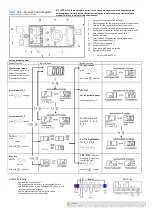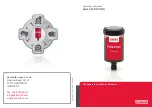
66037
2
Rev. 09/14/05
INSPECTION
Visual inspection should be made before each use of the
jack, checking for leaking hydraulic fluid and damaged,
loose or missing parts. Each jack must be inspected by a
manufacturer’s repair facility immediately, if subjected to
an abnormal load or shock. Any jack which appears to be
damaged in any way, found to be badly worn, or operates
abnormally
MUST BE REMOVED FROM SERVICE
until
necessary repairs are made by a manufacturer’s authorized
repair facility. It is recommended that an annual inspection
of the jack be made by a manufacturer’s authorized repair
facility and that any defective parts, decals or warning labels
be replaced with manufacturer’s specified parts.
A list of authorized repair facilities is available from
the manufacturer.
OPERATING INSTRUCTIONS
IMPORTANT:
Before attempting to raise a vehicle, check
vehicle service manual for recommended lifting surfaces.
1.
To raise load:
Close release valve tightly (by turning
handle clockwise).
DO NOT OVER TIGHTEN.
Position
jack under load so that saddle will contact load firmly and
load is centered so it cannot slip. Operate jack handle until
saddle approaches the load. Once again check to see that
saddle is correctly positioned. Raise load to desired height.
Place jack stands of appropriate capacity under the vehicle.
DO NOT CRAWL UNDER VEHICLE WHILE LIFTING
VEHICLE OR PLACING OR REMOVING JACK
STANDS!
Place jack stands at vehicle manufacturer's
recommended lift areas that provide stable support for
the raised vehicle.
2.
To lower load:
Open release valve
VERY SLOWLY
(by turning handle counterclockwise). When release valve
is opened, saddle and load will be lowered. Lower the
vehicle slowly so as not to shock load the jack stands.
Once repairs are completed, raise vehicle enough to
remove jack stands. Lower vehicle very slowly.
CAUTION:
Keep hands or feet away from the hinge
mechanism of the jack.
MAINTENANCE
IMPORTANT:
When adding or replacing hydraulic fluid,
always use a quality hydraulic fluid.
DO NOT
use brake
fluid, alcohol, glycerine, detergent motor oil, or dirty oil as
improper fluid can cause serious internal damage to jack.
To add hydraulic fluid: With saddle fully lowered and jack on
level ground, remove breather. The hydraulic fluid should just
cover the surface of the internal cylinder visible through the hole.
Do not overfill. Replace breather. If low, add hydraulic fluid
as needed.
Maintenance and Inspection:
The owner and/or user
must maintain and inspect the jack in accordance with the
manufacture's instruction
LUBRICATION
All moving joints require lubrication on a regular maintance
schedule. Remove handle and grease the lower end of handle
where it rotates in the handle socket. Using a grease gun,
lubricate the lift arm pivot shaft grease fitting until grease
appears at the end of the shaft. Grease all lift arm linkages,
front wheels and rear casters.
OWNER/USER RESPONSIBILITY
The owner and/or user must have a thorough understanding of
the manufacturer’s operating instructions and warnings before
using this jack. Personnel involved in the use and operation of
equipment shall be careful, competent, trained, and qualified
in the safe operation of the equipment and its proper use when
servicing motor vehicles and their components. Warning
information should be emphasized and understood. If the
operator is not fluent in English, the manufacturer’s instructions
and warning shall be read to and discussed with the operator
in the operator’s native language by the purchaser/owner,
making sure that the operator comprehends its contents.
Owner and/or user must study and maintain for future refer-
ence the manufacturers’ instructions. Owner and/or user is
responsible for keeping all warning labels and instruction
manuals legible and intact. Replacement labels and literature
are available from the manufacturer.
PROPER STORAGE
It is recommended that this jack be stored in a dry location
with all wheels touching the ground on a relatively level
surface.
TROUBLESHOOTING
Important: Service jacks are self-contained devices used for
lifting, but not sustaining, a partial vehicular load. In accor-
dance with ASME-PALD standard, section 10-4.1.2 Load
Sustaining Test: “A load not less than the rated capacity…
shall not lower more than 1/8” (3.18mm) in the first minute,
nor a total of .1875” (4.76mm) in 10 minutes.” Leak down
within this range is considered normal operation and is NOT
a warrantable defect.






















